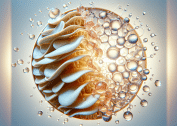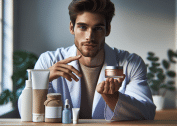Discover how collagen impacts glowing skin, helps with smoothing fine lines, and supports youthful radiance. This article explores what actually influences collagen production, daily skincare routines, and how lifestyle choices can unlock natural beauty from within.
Understanding Collagen and Skin Vitality
Collagen is a major structural protein found throughout the human body, often referenced when discussing glowing skin and anti-aging. As one of the primary building blocks, collagen helps maintain the firmness, elasticity, and resilience that give complexions a youthful glow. Over time, however, the body’s ability to synthesize collagen naturally declines, which is frequently associated with visible changes such as sagging skin and the formation of fine lines. Exploring how collagen interacts with other essential skin elements gives context to why it’s so important in skincare conversations.
Many people wonder if certain skincare routines or nutrition tweaks can boost natural collagen production. Experts note that vitamin C, amino acids, and certain peptides all play a role in collagen synthesis. While many products claim to promote glowing skin, the science highlights the synergy of diet, topical skincare, and lifestyle in preserving and enhancing collagen’s effects. By understanding how the body uses nutrition alongside external applications, individuals can make informed choices to support skin health at every age.
It’s important to remember that the collagen story is more complex than any single product promise. Environmental stressors, chronic sun exposure, and lifestyle habits like smoking may accelerate the breakdown of collagen fibers, impacting how skin looks and feels. Protecting skin from these triggers and nurturing internal collagen pathways with a balanced approach to wellness provides a strong foundation for skin vitality. Ultimately, glowing skin is rarely about quick fixes and more about consistent, evidence-based habits.
Everyday Habits that Support Natural Collagen
Daily habits can have a significant effect on how the body maintains collagen supplies. Sun protection ranks at the top of the list. Repeated ultraviolet (UV) exposure directly damages collagen fibers and inhibits the skin’s ability to produce new collagen. Applying broad-spectrum sunscreen, seeking shade, and wearing protective clothing are practical ways to conserve the collagen that contributes to glowing and smooth skin. In fact, dermatologists highlight sun safety as one of the most effective practices in maintaining firmness and youthful appearance over time.
Nutrition plays a key role, too. Diets rich in vitamin C from sources such as oranges, kiwi, and red bell peppers can support the body’s efforts to generate and repair collagen. Protein sources, especially from lean meats, fish, beans, and legumes, provide important amino acids like proline and glycine, essential for collagen synthesis. Avoiding excessive sugar and highly processed foods is also recommended, as glycation can stiffen collagen, making skin appear dull or prematurely wrinkled.
Movement and exercise may also stimulate natural collagen renewal. Increased blood flow nourishes the skin and delivers vital nutrients, while strength-building activities help preserve connective tissue and tone. By weaving together healthy eating, skincare protection, and regular activity, many people find they not only look but also feel more vibrant, reflecting broader wellness beyond the surface.
Skincare Routines that Favor Collagen Resilience
Choosing the right skincare routine can directly influence how much support is given to natural collagen processes. Gentle cleansing is important to avoid stripping the skin’s natural barrier, which can indirectly reduce collagen reserves. Incorporating products with proven ingredients such as retinoids, vitamin C serums, and peptides helps stimulate collagen production and support smooth, luminous skin.
While some topical formulations are formulated specifically to boost collagen, their effectiveness often depends on concentration and delivery systems. Consistency is key—most skin-improving ingredients require months of use to show measurable effects. Alongside these targeted serums, regular exfoliation (using chemical exfoliants or mild physical scrubs) encourages cell turnover and maximizes how well ingredients absorb. But over-exfoliation can cause inflammation and diminish collagen, so a balanced approach is crucial.
Moisturizers and sun protection round out a robust collagen-friendly regimen. Hydration ensures the skin retains elasticity, while sunscreen remains the most effective way to prevent environmental collagen damage. For individuals interested in professional treatments, options such as microneedling or light-based therapies have been shown to stimulate collagen in the deeper layers of skin, though results and recommendations vary by individual needs and health background.
Supplements and Collagen: What Science Says
Collagen supplements are highly visible in the wellness industry. Many promise improved skin elasticity, reduced fine lines, and stronger nails and hair. The science behind these claims is still developing. Several studies suggest that oral collagen peptides may enhance skin hydration and density by delivering the necessary building blocks for collagen synthesis. However, results are mixed, and experts agree these are not magical cures but supportive additions when paired with comprehensive wellness practices.
It is essential to recognize that not all supplements are created equal. Product quality, dosage, and the type of collagen (marine, bovine, or chicken-derived) can affect absorption and efficacy. Some research points to minor improvements in skin texture after months of consistent use, particularly when combined with antioxidants like vitamin C. This combination seems to amplify the natural processes that drive skin rejuvenation rather than work through instant transformation.
Before starting any supplement regimen, consulting with a healthcare provider is recommended—especially for individuals with allergies or chronic conditions. While some people notice positive changes, the wider scientific consensus underscores that lifestyle, nutrition, and skincare habits play a more influential role in achieving the luminous appearance many seek. Collagen supplements work best as a complement, not a substitute, for foundational wellness choices.
Lifestyle Factors That Influence Radiant Complexion
Lifestyle choices—from sleep routines to stress management—shape more than just mood. They deeply affect the skin’s outer glow and dermal health. Chronic stress triggers the release of cortisol, a hormone that can break down collagen fibers and slow healing. Integrating mindful moments or relaxation routines helps curb this cascade and can benefit both appearance and well-being.
Quality rest also stands as a pillar of skin recovery. During deep sleep, the body produces growth hormones that aid in tissue repair and boost collagen formation. Skimping on sleep can lead to sallow skin, more noticeable lines, and reduced skin resilience. Building a calming bedtime ritual, maintaining consistent hours, and minimizing digital device exposure before sleep can support the natural nocturnal rhythms needed for skin rejuvenation.
Lastly, smoking and excess alcohol intake are recognized as significant collagen saboteurs. Both habits have been strongly associated with diminished collagen production and premature skin aging in clinical observations. Empowering lifestyle choices—choosing nutrient-rich foods, limiting toxins, and tending to emotional balance—create a supportive environment where collagen can thrive, reflected in a visiblly healthy, glowing complexion.
Myths, Trends, and Realities of Collagen Beauty
The wellness and beauty industry is full of marketing claims around collagen, sometimes stretching what science supports. For example, not all topical collagen creams can actually penetrate to deeper skin layers where it is most needed. Instead, products that stimulate natural collagen production—with ingredients like retinol or certain peptides—are more likely to nudge visible benefits over time.
Popular trends like bone broth, collagen-infused beverages, and specialty beauty drinks have advocates and critics alike. Most research suggests that the effect of consuming collagen-rich foods or drinks depends on overall dietary patterns and digestive health. Collagen molecules are often broken down in the stomach before they can act directly on skin, but the amino acids they supply can help the body build new collagen—if supported by other wellness habits.
To navigate these trends wisely, look for evidence-based products, prioritize sun protection, and support holistic wellness. The enduring truth is that glowing skin begins with healthy, well-supported collagen—nourished inside and out by a combination of care, science, and personal commitment.
References
1. National Institutes of Health. (2020). Collagen: What it is and what it does. Retrieved from https://www.niams.nih.gov/health-topics/collagen
2. American Academy of Dermatology Association. (2022). Skin care and aging. Retrieved from https://www.aad.org/public/everyday-care/skin-care-basics/care/skin-care-and-aging
3. Harvard T.H. Chan School of Public Health. (2021). The nutrition source: Protein. Retrieved from https://www.hsph.harvard.edu/nutritionsource/what-should-you-eat/protein/
4. Cleveland Clinic. (2023). Collagen supplements: Benefits and side effects. Retrieved from https://health.clevelandclinic.org/should-you-be-taking-collagen-supplements/
5. Skin Cancer Foundation. (2022). How the sun affects your skin. Retrieved from https://www.skincancer.org/skin-cancer-prevention/sun-protection/
6. Mayo Clinic. (2022). Healthy lifestyle: Sleep tips. Retrieved from https://www.mayoclinic.org/healthy-lifestyle/adult-health/in-depth/sleep/art-20048379









